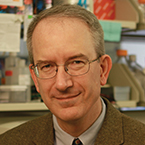
For dissecting the fundamental nature of B-cell lymphoma and human lymphoid malignancies, and for highlighting how gene expression profiling may be used to identify distinct cancer types and subtypes, leading to the use of RNAi technologies to develop novel targeted therapeutics for the treatment of hematologic malignancies.
A distinguished and celebrated cancer researcher, Dr. Staudt is revered for his use of genomics to dissect B cell lymphoma biology, and to improve the diagnosis and treatment of human lymphoid malignancies. His research has highlighted how gene expression profiling may be used to identify distinct cancer subtypes. Specifically, he was the first to differentiate two subtypes of diffuse large B cell lymphoma (DLBCL) as molecularly distinct diseases. By developing gene expression signatures of normal B cell differentiation, Dr. Staudt discovered that activated B cell-like (ABC) and germinal center B cell-like (GCB) DLBCL subtypes arise from different stages of B cell development. He established that genomic profiles of tumors can predict their response to therapy, a principle he has applied to DLBCL, chronic lymphocytic leukemia, mantle cell lymphoma, and follicular lymphoma. Using multi-platform profiling of DNA mutations, copy number and rearrangements he has established the genetic basis for DLBCL, defining 7 distinct subtypes that differ in their genetic abnormalities, gene expression signatures, and response to both chemotherapy and targeted therapies.
Dr. Staudt has brilliantly utilized RNA interference screens and cancer genome resequencing to uncover essential signaling pathways that lymphomas require for their aberrant proliferation and survival. In the most difficult to treat DLBCL subtype, ABC, Dr. Staudt’s functional genomic screens revealed that chronic active B cell receptor (BCR) signaling sustains malignant B cell survival by engaging the anti-apoptotic NF-kB pathway. He discovered recurrent mutations in ABC tumors that target the B cell receptor subunit CD79B and promote this oncogenic BCR signaling. His functional genomic screens further identified MYD88, an adaptor protein necessary for toll-like receptor signaling, as essential for the survival of ABC cells. He discovered highly recurrent MYD88 mutations in lymphoma that create oncogenic MYD88 isoforms that associate with toll-like receptor 9 and the BCR, thereby augmenting NF-kB activation. Based on his laboratory investigations, he initiated and led a clinical trial of the BCR signaling inhibitor ibrutinib in relapsed and refractory DLBCL. As he predicted, objective responses were frequent in ABC but rare in GCB DLBCL and were especially frequent in tumors with both MYD88 and CD79B mutations. He has identified multiple targeted agents that synergize with ibrutinib in killing ABC cells and has worked with his clinical colleagues at the National Cancer Institute to devise effective combination regimens for lymphoma based on synergistic drug combinations.
Career Highlights
2020 Elected Member, National Academy of Medicine
2018 Director’s Award, National Cancer Institute
2017 AACR-Princess Takamatsu Memorial Lectureship, American Association for Cancer Research
2017 G. Burroughs Mider Lectureship, National Institutes of Health
2016 C. Chester Stock Award Lectureship, Memorial Sloan Kettering Cancer Center
2014 San Salvatore Foundation Prize, Lugano-Svizzera, Switzerland
2013 Elected Member, National Academy of Sciences
2011 Designated as an NIH Distinguished Investigator, National Institutes of Health
2009 Dameshek Prize, American Society of Hematology
2004 Elected Member, Association of American Physicians
2002 McCredie Lecturer, Leukemia and Lymphoma Society
1992 Arthur S. Flemming Award, George Washington University